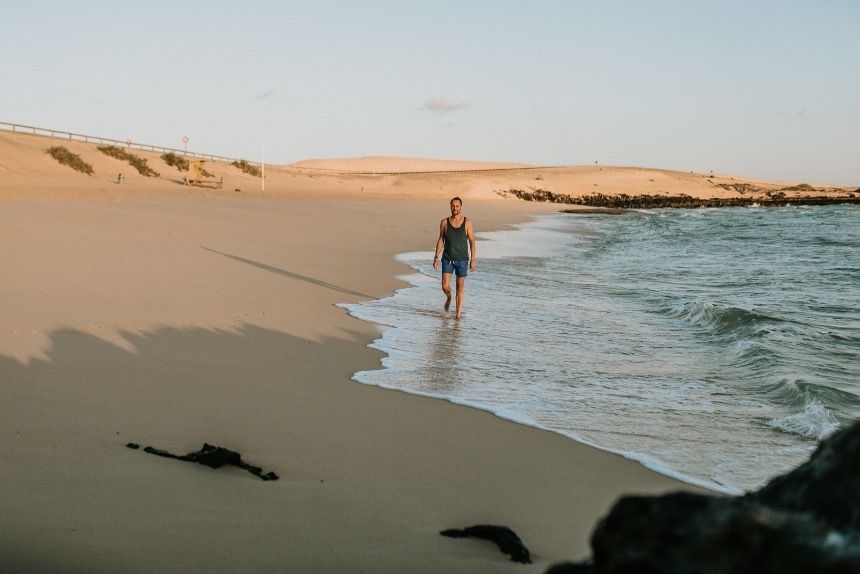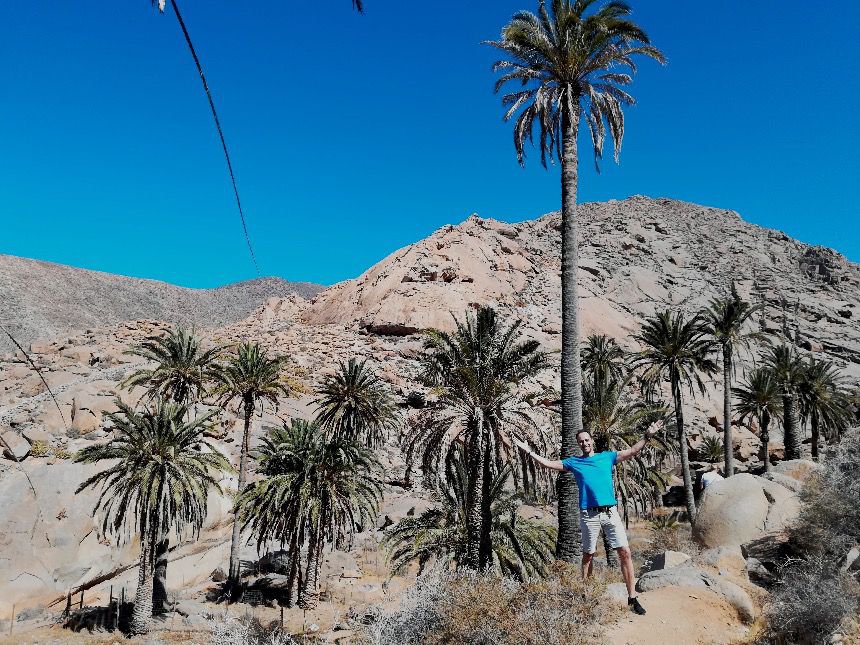FUERTEVENTURA - MY 12 HIGHLIGHTS ON THE CANARY ISLAND
Rugged volcanoes, dream beaches, quaint villages and plenty of nature characterise Fuerteventura, the second largest Canary Island.
*Promotion*
FUERTEVENTURA - MY 12 HIGHLIGHTS ON THE CANARY ISLAND

SPRING IN LATE AUTUMN
After a four-year absence, it was again time for a trip to the Canary Island of Fuerteventura. Late autumn or winter is the ideal time to visit the Canary Islands. Pleasant temperatures - you can spend the whole day in the fresh air and swim in the Atlantic. My personal power spot on Fuerteventura is the famous nature park in Corralejo, with its beautiful dunes and incomparable views of the neighbouring islands of Lobos and Lanzarote. Seeing this stretch of coastline with its turquoise-colored sea gives me a natural feeling of happiness.

COLOUR PLAYS
It is a little-known fact that "Fuerte" is the oldest Canary Island and rose out of the sea 20 million years ago. The barren hilly landscape is bizarre, and its colours change in fascinating ways throughout the day. At 1,660 square kilometres, Fuerteventura is the second largest Canary Island after Tenerife. However, it is very sparsely populated, with just under 120,000 inhabitants.

Even Alexander von Humboldt was fascinated by the "special light of Fuerteventura" on his travels. You can admire a veritable light show with constantly changing colours at sunset - simply magical! Fuerteventura has 150 kilometres of sandy beaches, some of which are among the most beautiful in Europe.The many endemic plants and over 1,000 lichen species are also remarkable, so the island isn't all that barren.

Below I present my 12 personal favourite places on "Fuerte".
1) THE NATURE PARK OF CORRALEJO
I have already mentioned this magical place. If you drive north from the airport along the coastal road, the light-coloured dunes appear after about 20 minutes. Surfers find their paradise here, but not only them.You can swim wonderfully at many sections of the "Parque Natural" - I recommend bathing shoes, as the fine sandy beach is interrupted here and there by rocky sections. Conquering the high dunes is a good leg workout that is rewarded with unrivalled views of the Atlantic and the islands of Lobos and Lanzarote. A walk along the beach here is almost a meditative experience; years ago, I practiced yoga there.


2) LAJARES - A REALLY COOL VILLAGE
The term "hip" certainly applies to Lajares with its colourful mix of people. Although the beach is 8 km away, Lajares is considered a stronghold for surfers. An alternative scene has established itself here with life artists and those who want to become one. The cafés, shops, and restaurants are correspondingly colorful. All without the hustle and bustle of tourists, marvellous. I treated myself to a small lunch at "La Paneteca", which probably has the best bread on the island, much of it organic. Directly opposite is "El Goloso" with delicious cakes and a lovely roof terrace. However, you will look in vain for sights in Lajares.

3) CALDERÓN HONDO VOLCANO
I have fond memories of this mountain. It is only a few kilometres from Lajares, but Google Maps needed to tell me where to park the hire car and where to walk the rest. So, I drove past the volcano and found myself in the coastal town of Majanicho. The view of the Atlantic and the neighbouring islands was once again magnificent. However, instead of returning here at the latest, I continued on the gravel road. I was seriously worried about the tires of my rental car. However, it held out, and the journey ended in the harbour of Corralejo. As it was already quite late, I changed my plan and drove to the village of El Cotillo to view the sunset, which turned out to be an excellent idea. But more on that later.

Back to the volcano - it's pretty simple: you turn right at the football pitch on the main road in Lajares, and shortly after a couple of unmissable bars on the left, you have to park your car (an information board indicates this). The hike to the crater begins at a leisurely pace on a flat stretch before becoming quite steep. At some point, I found myself on a narrow path that was very slippery due to small stones. Unfortunately, I had left one of the main paths. Instead of breaking off, I continued on my way until it really became too slippery. Then there was the wind, which didn't help my balance. To cut a long story short, I literally scrambled down part of the 278-metre-high volcano, only to continue my ascent on the broad path, which later became narrower and narrower. This mountain and I are probably not going to be the best of friends. But the climb is worth it! The view of the gigantic crater and the surrounding area is breathtaking. Tip: Take sun protection, provisions, and possibly a light jacket on cooler days. Then, the climb will be an authentic experience.

4) MAGICAL SUNSET IN EL COTILLO!
I have already mentioned this picturesque place on the northwest coast of Fuerteventura. You can be here from Corralejo in just over 20 minutes. My tip: El Cotillo has one of the most beautiful sunsets on the island! Stroll through the town or the promenade beforehand and marvel at the incredible murals. Some restaurants, such as "La Vaca Azul," invite you to linger on their terraces. An older man sits down on a rock by the sea and begins to paint while the sun slowly sinks. The guitar sounds fill the air, and a young woman sings, "What a wonderful world."The perfect ambiance to enjoy the moment, listen to the waves, and forget all the world's problems. Magical moments!The fact that I then spent more than 30 minutes looking for my hire car in the town remains between us - ok?


5) BETANCURIA - WHAT A PRETTY PLACE
It's hard to believe, but Betancuria used to be the capital of Fuerteventura. However, that was quite a while ago, from 1404 to 1834. Today, less than 1,000 people live in this tranquil mountain village, which you should visit. It is easily accessible by hire car from both the north and south of Fuerteventura. In addition to the little church of Santa Maria de Betancuria, the village is characterised by its narrow streets with numerous pretty cafés and restaurants. I had to pick up the key for the public toilet in the souvenir shop, which tempted me to buy an aloe vera lotion. Very important: there is not a single petrol station in Betancuria. You can refuel either in Antigua or in Tuineje. Both places are a good 15-minute drive from Betancuria.


6) MIRADOR MORRO VELOSA
On the way from Antigua to Betancuria, you will automatically pass the Morro Velosa viewpoint, one of the most beautiful in Fuerteventura. Strictly speaking, there are two so-called "miradores", both worthwhile. On the well-maintained winding road, you can see a small building on a 650 metre high peak from afar. Unfortunately, the building with its café and panoramic windows was closed. Still, the drive up is worth it for the impressive view of the mountains. Shortly afterward, you will pass two statues. The view from here is also worthwhile, and on a clear day, you can even see the dunes of Corralejo.


7) BARRANCO RIO PALMAS
The municipality of Vega de la Palma, located in a fertile Barranco has just 200 inhabitants. The many Canary Island date palms and tamarisk trees are striking. On this Sunday, sacred singing rang out from the Ermita de Nuestra Señora de la Peña. Right next to the little church is a small restaurant in a pretty building - a nice stop for a coffee break.

A good kilometre away, you can turn right on the main road and drive to the Barranco de las Peñitas. Here, the many Canary Island date palms find enough groundwater to grow lushly - a rarity on the otherwise dry island of Fuerteventura. The narrow gorge with its steep rock faces and pools of water is spectacular - well worth seeing! No wonder this area has been the setting for numerous films such as "Exodus".

8) MIRADOR RISCO DE LAS PEÑAS
You can't miss this viewpoint on the way from Betancuria to Pájara. A photo stop here is definitely worthwhile. The views across the Barranco de Rio Palmas to the Atlantic Ocean are spectacular. With some luck, you might spot some impressive birds of prey. On the winding road, you will see wild goats repeatedly; Fuerteventura used to be called "Isla de las Cabras," the island of goats. I was also impressed by the cyclists who pled up the road. Again and again, palm trees rise up from the rugged mountains. I see lonely farmsteads at the bottom of the valley - do people really live there? There are said to be inhabitants of Fuerteventura who have never seen the sea.


9) AJUY - SEA BREEZE AND IMPRESSIVE CAVES
It is not far from Vega de la Palma to Pajara, and the coastal town of Ajuy, which impressed me. A tiny fishing village with a few (not very cheap) restaurants right on the dark sandy beach. After all the driving, I treated myself to a lunch with a sea view, which was wonderfully relaxing. A lot was going on in Ajuy on this sunny Sunday. The ruthless waitress at La Maresia restaurant had the bill ready quickly, and more guests were already waiting. The sun worshippers lie here on beach towels; there are no deckchairs or parasols on Ajuy beach. It's just not so touristy here; it is very refreshing.


After a short sunbath (unfortunately, I didn't have any swimming trunks with me), I took a steep path along the coast to the caves of Ajuy, passing numerous limestone cliffs. The "Monumento Nacional de Ajuy" nature park was established here in 1994, meaning the area is a protected nature reserve. You will find numerous photo opportunities on the way and can descend a little to the sea. Here, the waves crash impressively against the rocks.

The tour continues to the Ajuy caves, which are located outside of the cliffs. Pirates once used them to hide booty. A staircase leads to the caves, and you must climb a little. You should, therefore, only conquer the caves with sturdy shoes. The sunset in Ajuy is also worthwhile - directly on the beach or on the higher rocks.


10) COFETE - INSTAGRAMMERS' FAVOURITE PLACE
Well, what can I say? A visit to this spectacular natural beach on the south coast of Fuerteventura is well worth it - Cofete is one of the island's natural highlights. The beach can only be reached via a gravel track, so you must drive carefully. You will be rewarded with breathtaking views of a mountain massif up to 807 meters high, the endless expanse of the rough Atlantic Ocean, and the white crests of the waves. On the way, you will pass the village of Cofete and get an idea of how people used to live in Fuerteventura. In the middle of nowhere stands the white Villa Winter, which is surrounded by many stories, some of which are linked to the Nazi era. It was named after the German engineer Gustav Winter, who had it built during the Second World War. Sounds interesting? Then, take a look at the Villa Winter website.

11) PUERTO DEL ROSARIO
The capital of the island of Fuerteventura is a small town of just 40,000 inhabitants. It has no significant highlights, but perhaps you'd like to taste a bit of "city air." I really liked the promenade by the sea. Here, you can marvel at the large cruise ships and yachts. Sculptures and street art can be found around the harbour and in the town.

A small museum has been built here in honour of the famous philosopher and writer Miguel de Unamuno, who was exiled in 1924 for his resistance against the military. Admission is free, and the museum is open Monday to Friday from 9 am to 2 pm. Numerous cafés and restaurants are offering typical Canarian cuisine on the main street. The small town hall with the monument to Unamuno in front of it is also pretty.

12) EXCURSION TO THE ISLAND OF LOBOS
This almost uninhabited rocky outcrop is impossible to miss on the journey towards Corralejo. The ferry crossing from Corralejo takes about 15 minutes - and you are already in another world. The islet, which is just 4.58 square kilometres in size, has been a nature reserve since 1982. The highest mountain is Montaña La Caldera at 127 metres, which is well worth the climb. Lobos was formed between 15,000 and 30,000 years ago and was once connected to Fuerteventura. The name comes from the monk seal ("Lobo marinero"), which was strongly represented here until its extinction in the 15th century. Lobos is ideal for hiking. Nobody really lives in the village of "El Puertito."Most people come here as day visitors, including the owners of the only very simple restaurant. El Puertito is a typical Canarian village with very narrow streets. The turquoise lagoon is surprisingly inviting for swimming and snorkelling. Have I piqued your interest in the island of Lobos? Then, take a look at my report on this unique island.



TIPS FROM A LOCAL
Finally, a few tips from a local. Mar Mora, responsible for marketing at the Secrets Bahía Real Resort & Spa, is a true "majorera", i.e., born in Fuerteventura.
RESTAURANT MUANA MBOKA GASTRONOMIC EXPERIENCE
Africa is close, so how about a restaurant in La Oliva with tents, carpets, an African atmosphere, and fusion cuisine? Culinary delights in an exceptional open-air restaurant.

ASTROCIENCIA NOMADA
The Astrociencia Nomada is an absolute highlight. Experience the secrets of the sky, the stars, and the planets orbiting them. Fuerteventura has again been awarded the "Reserva Starlight" award by the Fundación Starlight, which certifies the quality of the night sky with very low light pollution.
THE WILD SURF SCHOOL FUERTEVENTURA
The Wild Surf Fuerteventura Surf School in Corralejo is the best address for anyone who wants to learn the fine art of surfing. The staff is extremely friendly, highly professional, and - most importantly - very patient. I'm making a note of it for my next life.

TRAVELLING TO Fuerteventura
The international airport is 5 kilometers from the capital Puerto del Rosario. Here you will find an overview which airlines connect Fuerteventura with European hubs. Flights from continental Europe take a bit more than four hours. There are regular ferries from Morro Jable in the south of Fuerteventura and from Corralejo to the neighbouring islands of Gran Canaria and Lanzarote.

WHAT IS THE WEATHER LIKE IN FUERTEVENTURA
The climate of the Canary Islands, the islands of "eternal spring", is considered one of the best in the world. It only gets unpleasant for a few weeks a year when the "calima" arrives. A desert wind from the Sahara brings heat and lots of sand dust (sometimes 2 kg per square kilometer yearly). I remember seeing cars covered in dust in the past. Fuerteventura has an average of 5 rainy days a year; there are no cold days here. At night, it can rarely get as hard as 10 degrees Celsius. You can swim in the sea year-round.

STAYING OVERNIGHT IN FUERTEVENTURA
I spent four nights at the Secrets Bahía Real Resort & Spa in Corralejo, one of my favourite hotels in the world, and two more at the Sheraton Fuerteventura Golf & Spa Resort in Caleta de Fuste (near the airport, hotel report to follow). I really enjoyed both hotels. Of course, there are also cheaper accommodation options (including the so-called "alojamiento rural", accommodation on the countryside), so check out the Patronato de Turismo de Fuerteventura website. A little insider tip is the charming Bed & Breakfast Hélène in Corralejo (adults only).


TRAVELLING ON FUERTEVENTURA
Fuerteventura has a good bus network. 17 lines connect the northern and southern parts of the island. I recommend hiring a hire car or even a jeep. The roads are well-developed with a few exceptions (e.g., Cofete). A bicycle is recommended for those with sporting ambitions.

THE MAIN DISTANCES FROM THE AIRPORT TO:
Corralejo - 39 km, approx. 40 minutes
Morro Jable - 84 km, approx. !hour 15 minutes
Costa Calma - 65 km, approx. 60 minutes Caleta de Fuste - 8 km, approx. 10 minutes.
You can find more information about Fuerteventura on the Patronato de Turismo website.
Have you ever been to Fuerteventura? If so, tell me about your favourite places on this extraordinary island.
P.S. Thanks to the Patronato de Turismo and Sandra Waldherr Hansen, Sales Director at Secrets Bahía Real Resort & Spa, for all the tips. My trip was supported by the Patronato de Turismo de Fuerteventura and the two hotels mentioned above. However, this did not influence my reviews in any way.
If you are also interested in the neighbouring island of Lanzarote, look at my travel report.




